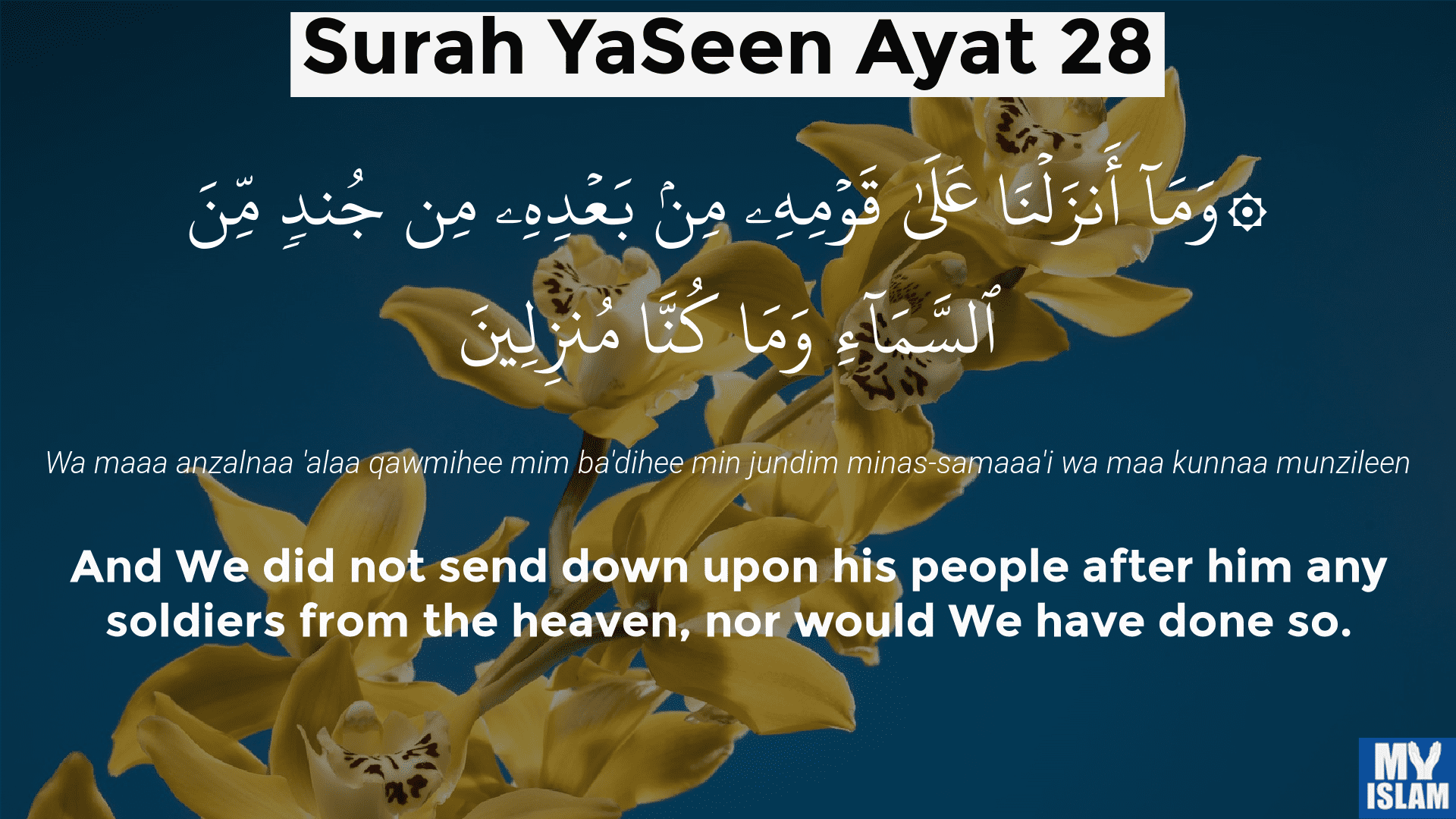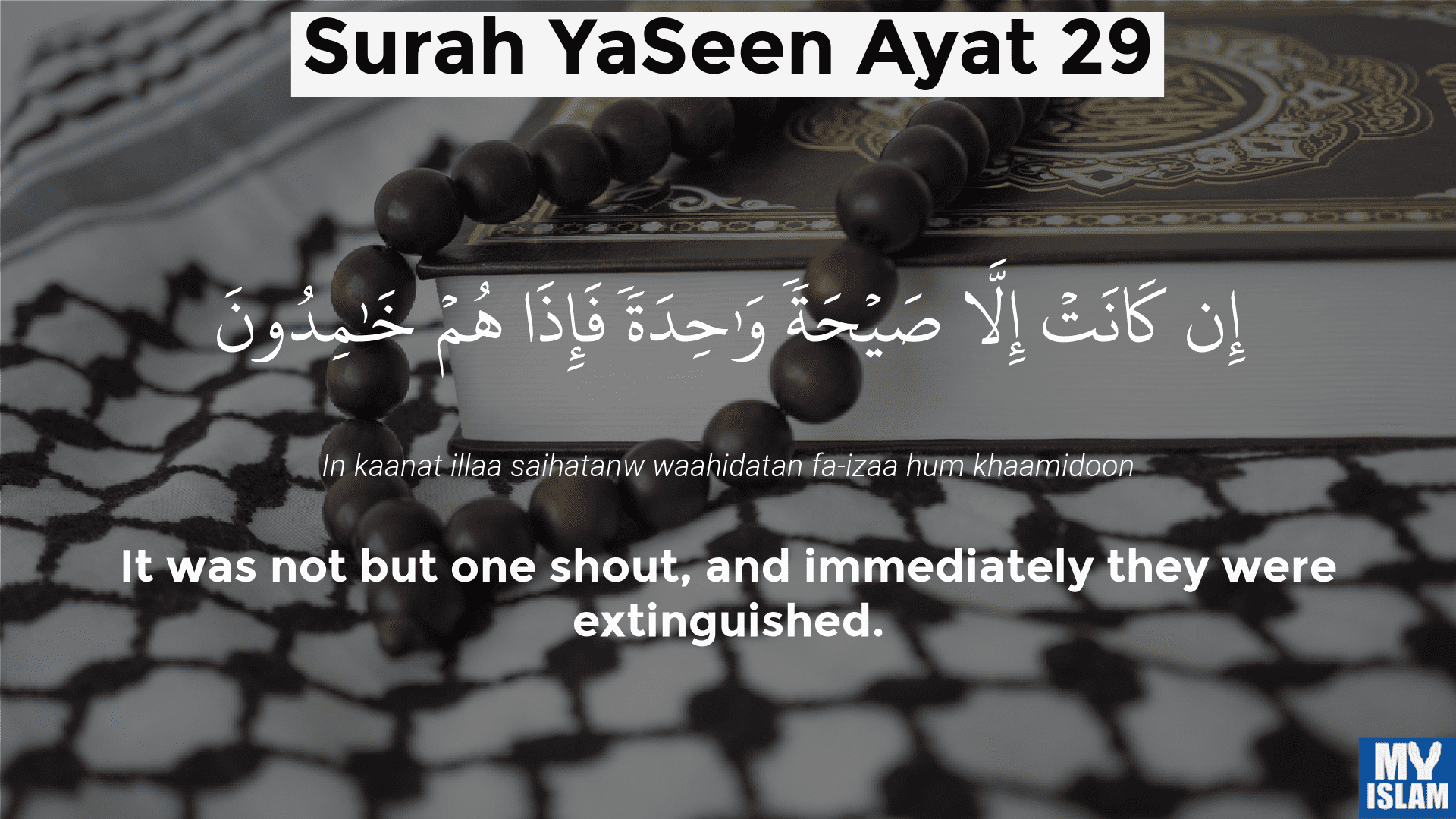Surah Yaseen Ayat 26 in Arabic Text
English Translation
Here you can read various translations of verse 26
It was said, “Enter Paradise.” He said, “I wish my people could know
It was said: “Enter thou the Garden.” He said: “Ah me! Would that my People knew (what I know)!-
(Eventually they killed him and he was told): “Enter Paradise.” The man exclaimed: “Would that my people knew
It was said (to him when the disbelievers killed him): “Enter Paradise.” He said: “Would that my people knew!
It was said (unto him): Enter paradise. He said: Would that my people knew
It was said, “Enter the Garden!” He said, ” Oh, would that my people knew.
He was told, ‘Enter the Garden,’ so he said, ‘If only my people knew
(اس سے) کہا گیا کہ جنت میں چلا جا، کہنے لگا کاش! میری قوم کو بھی علم ہو جاتا
Quran 36 Verse 26 Explanation
For those looking for commentary to help with the understanding of Surah Yaseen ayat 26, we’ve provided two Tafseer works below. The first is the tafseer of Abul Ala Maududi, the second is of Ibn Kathir.
Ala-Maududi
(36:26) (Eventually they killed him and he was told): “Enter Paradise.”[22] The man exclaimed: “Would that my people knew
22. That is, immediately following his martyrdom, the man was given the good news of Paradise. As soon as he entered the next world through the gate of death, there were the angels to receive him, and they gave him the good news that Paradise was awaiting him. The commentators have disputed the meaning of this sentence. Qatadah says: Allah admitted him into Paradise straight away and he is living in it and receiving his sustenance. And Mujahid says: This was told him by the angels as a good news; he will enter Paradise on the day of Resurrection along with the other believers.
Ibn-Kathir
26. It was said: “Enter Paradise.” He said: “Would that my people knew.” 27. “That my Lord (Allah) has forgiven me, and made me of the honored ones!” 28. And We sent not against his people after him an army from the heaven, nor was it needful for Us to send (such a thing). 29. It was but one Sayhah and lo! they (all) were still.) Muhammad bin Ishaq reported from some of his companions from Ibn Mas`ud, may Allah be pleased with him, that they stamped on him until his intestines came out of his back passage. Allah said to him:
(“Enter Paradise.”) so he entered it with all its bountiful provision, when Allah had taken away from him all the sickness, grief and exhaustion of this world. Mujahid said, “It was said to Habib An-Najjar, `Enter Paradise.’ This was his right, for he had been killed. When he saw the reward,
(He said: “Would that my people knew…”).” Qatadah said, “You will never find a believer but he is sincere and is never insincere. When he saw with his own eyes how Allah had honored him, he said:
(He said: “Would that my people knew that my Lord has forgiven me, and made me of the honored ones!”) He wished that his people could know about what he was seeing with his own eyes of the honor of Allah.” Ibn `Abbas said, “He was sincere towards his people during his lifetime by saying,
(O my people! Obey the Messengers), and after his death by saying:
(Would that my people knew that my Lord (Allah) has forgiven me, and made me of the honored ones!) This was recorded by Ibn Abi Hatim. Sufyan Ath-Thawri narrated from `Asim Al-Ahwal from Abu Mijlaz:
(That my Lord has forgiven me, and made me of the honored ones!) “Because of my faith in my Lord and my belief in the Messengers.” He meant that if they could see the great reward and everlasting blessings that he had attained, this would lead them to follow the Messengers. May Allah have mercy on him and be pleased with him, for he was so keen that his people should be guided.
(And We sent not against his people after him an army from the heaven, nor was it needful for Us to send.) Allah tells us that He took revenge on his people after they had killed him because He, may He be blessed and exalted, was angry with them, for they had disbelieved in His Messengers and killed His close friend. Allah tells us that He did not send an army of angels, nor did He need to send them, to destroy these people; the matter was simpler than that. This was the view of Ibn Mas`ud, according to the reports of Ibn Ishaq from some of his companions concerning the Ayah:
(And We sent not against his people after him an army from the heaven, nor was it needful for Us to send.) He said: “`We did not seek to outnumber them, for the matter was simpler than that.”
(It was but one Sayhah and lo! they (all) were still.) He said, “So Allah destroyed that tyrant king, and destroyed the people of Antioch, and they disappeared from the face of the earth, leaving no trace behind. It was said that the words
(nor was it needful for Us to send (such a thing).) mean, `We did not send the angels against the nations when We destroyed them; all We did was to send the punishment to destroy them.’ It was said that the words:
(And We sent not against his people after him an army from the heaven,) mean, another Message to them. This was the view of Mujahid and Qatadah. Qatadah said, “Allah did not rebuke his people after they killed him,
(It was but one Sayhah and lo! they (all) were still).” Ibn Jarir said, “The former view is more correct, because the Message does not need to be brought by an army.” The scholars of Tafsir said, “Allah sent Jibril, peace be upon him, to them, and he seized the pillars at the gate of their city, then he hurled one Sayhah upon them and lo! they (all) were still, to the last man among them, and no soul was left in any body.” We have already referred to the reports from many of the Salaf that this city was Antioch, and that these three Messengers were messengers sent from the Messiah `Isa bin Maryam, peace be upon him, as Qatadah and others stated. This is not mentioned by any of the later scholars of Tafsir besides him, and this issue must be examined from a number of angles. (The first) is that if we take this story at face value, it indicates that these men were Messengers from Allah, may He be glorified, not from the Messiah, peace be upon him, as Allah says:
(When We sent to them two Messengers, they denied them both; so We reinforced them with a third, and they said: “Verily, we have been sent to you as Messengers.”) up to:
(“Our Lord knows that we have been sent as Messengers to you. And our duty is only to convey plainly (the Message).”) If they had been from among the Disciples, they would have said something to indicate that they had come from the Messiah, peace be upon him. And Allah knows best. Moreover, if they had been messengers sent by the Messiah, why would the people have said to them,
(“You are only human beings like ourselves”) (The second) is that the people of Antioch did believe in the messengers sent by the Messiah to them. Antioch was the first city to believe in the Messiah, and it is one of the four cities in which there are Christian patriarchs. These cities are: Jerusalem, because it is the city of the Messiah; Antioch, because it was the first city where all of the people believed in the Messiah; Alexandria, because it was in that city that they agreed to reform the hierarchy of patriarchs, metropolitans (archbishops), bishops, priests, deacons and monks; and Rome, because it is the city of the Emperor Constantine who supported and helped to establish their religion. When he adopted Constantinople as his city, the Patriarch of Rome moved there, as has been mentioned by several historian, such as Sa`id bin Batriq and others, both People of the Book and Muslims. If we accept that, then the people of Antioch were the first to believe, but Allah tells us that the people of this town rejected His Messengers and that He destroyed them with one Sayhah and lo! they (all) were still. And Allah knows best. (The third) is that the story of Antioch and the Disciples of the Messiah happened after the Tawrah had been revealed. Abu Sa`id Al-Khudri, may Allah be pleased with him, and others among the Salaf stated that after revealing the Tawrah, Allah, may He be blessed and exalted, did not destroy an entire nation by sending a punishment upon them. Rather, He commanded the believers to fight the idolators. They mentioned this when discussing the Ayah:
(And indeed We gave Musa — after We had destroyed the generations of old — the Scripture) (28:43). This implies that the city mentioned in the Qur’an is a city other than Antioch, as also stated by more than one of the Salaf. Or, if we wish to keep the same name, it is possible that it is another Antioch, not the one which is well-known, for it is not known that it (the famous Antioch) was destroyed, either during Christian times or before. And Allah knows best.
Quick navigation links






